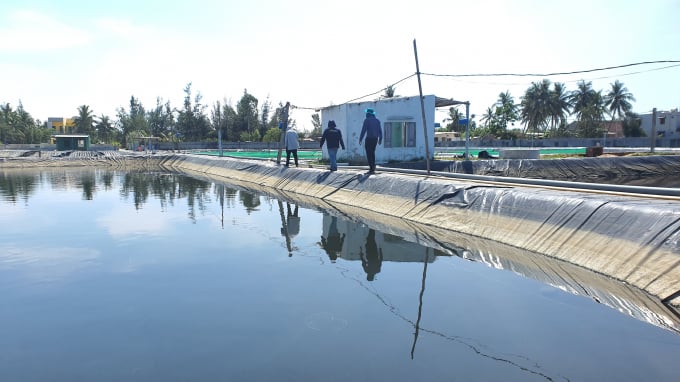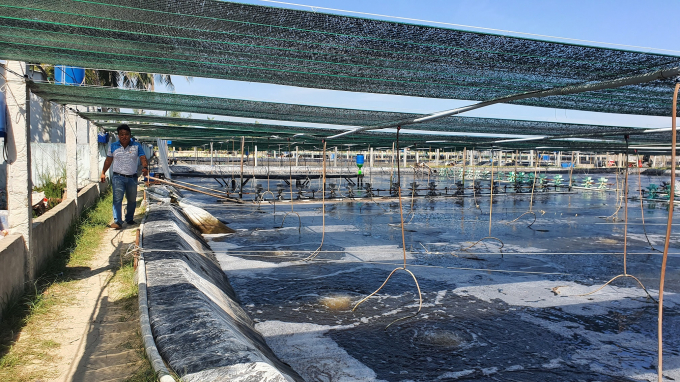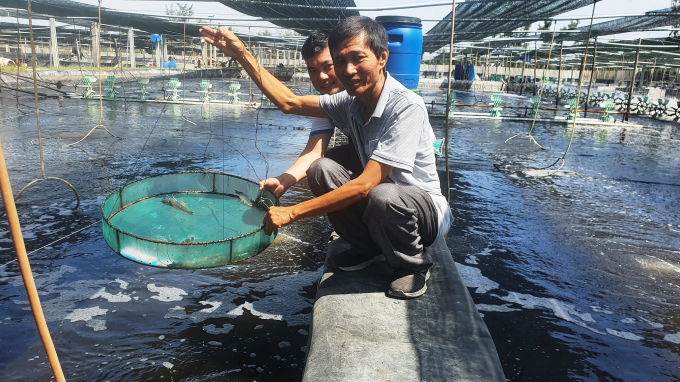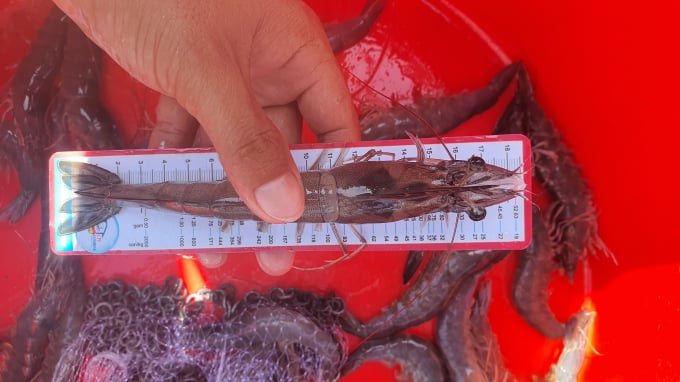May 17, 2025 | 19:49 GMT +7
May 17, 2025 | 19:49 GMT +7
Hotline: 0913.378.918
May 17, 2025 | 19:49 GMT +7
Hotline: 0913.378.918

The pond’s input water is treated to ensures a clean living environment for shrimp at Mr. Thanh's shrimp farm. Photo: L.K.
With years of experience in shrimp farming, Mr. Tran Cong Thanh residing in Tam Ky City, Quang Nam Province always understands that ensuring a good environment for shrimp is an extremely important condition that determines the success or loss of the farming.
Therefore, Mr. Thanh has always focused on water treatment in his shrimp farming over the past years. In fact, realities show that shrimp living in a clean environment will grow very well, limiting many common infections such as the white spots diseases and those affecting intestine and liver.
In 2019, Mr. Thanh built a water treatment system for his family's 8,000m2 pond and had got positive results. However, as the large farming area is too large that the treatment could not regularly supply adequate clean water for the ponds.
To cope with that, Mr. Thanh recently coordinated with the Vietnam Livestock Joint Stock Company to build a faster water treatment system on a larger scale. Mr. Thanh spent about 1.5ha of the former shrimp farming area to upgrade it into water treatment ponds removing all dirt and bacteria before supplying to shrimp ponds.

All of Mr. Thanh's shrimp ponds use treated water creating favorable conditions for shrimp to grow and develop well. Photo: L.K.
According to a representative from the Vietnam Livestock Joint Stock Company, this fast water treatment area includes a total of eight tarpaulin ponds connected together. In particular, the input water through the first pond will be treated with potassium permanganate and PAC to deposit organic, alum and metal. In addition, in the first treatment pond, mesh screens are also used to filter the processed impurities.
After that, the water source will be continuously circulated through the ponds from Monday to Saturday to clean bacteria and chlorine. When the water source is completely clear and clean, it is led to the final pond to supply shrimp farming. In this final pond, all indicators will be suitable for shrimp growth and development. At the same time, the water supply pond is also covered with tarpaulin to keep the temperature in balance with the water environment in the farming area.

Mr. Thanh said that shrimp living in clean water will grow very fast without disease thus grower can avoid loss and limit many risks. Photo: L.K.
Mr. Thanh estimated that with this fast water treatment model, each 1ha which needs an investment of about VND200 million, will bring in long-term profits. Currently, all shrimp ponds at Mr. Thanh's farm are supplied with clean water in four stages of which the first stage is focusing on growing shrimp seedlings because, at this stage, the shrimp’s resistance is still weak, it is necessary to add minerals and microorganisms to the water environment.
All the ponds in the next stages are supplied with clean water after treatment. Due to the clean environment, from the time of release to harvesting, the shrimp in Mr. Thanh's farm does not have to take any antibiotics thus the quality of shrimp is always guaranteed.
“In addition to fast water treatment technology, I apply all breeding standards of the Vietnam Livestock Joint Stock Company from seedling, feeding to applying techniques. Results after farming seasons show that shrimp are not infected with a disease and the loss rate is very low, only about 4%. Besides, shrimp also grow very quickly. In the last crop, I raised shrimp for 100 days but harvested 25 shrimp/kg. Very few farming models could achieve such a result," said Mr. Thanh.

After only about 100 days since releasing, shrimp in Mr. Thanh's ponds have reached a weight of about 23-25 shrimp/kg. Photo: L.K.
According to Mr. Thanh, with such a model of clean water environment and no use of antibiotics, harvested shrimp have met all standards of export to the most fastidious markets around the world. Recently, he has sold to the market nearly 10 tons of commercial shrimp with the selling price from VND160,000 to 180,000/kg, earning hundreds of millions of dong in profit.
“I find this fast water treatment model very effective, however, it is important to have enough land to build a separate treatment site. Hopefully, in the coming time, many shrimp farmers will be able to access and apply this method to increase economic efficiency and reduce risks when investing in aquaculture," Thanh said.
If the water environment is not treated by the fast water treatment technology but by directly treatment methods in a pond, it will take three or four days to release shrimp into the farm. Therefore, this model will help supply continuously clean water for the farm. Besides, due to the system of ponds linked together in the model, farmers can easily clean each pond ensuring uninterrupted water supply in the whole farming.

(VAN) Muong Nhe Nature Reserve hopes that being upgraded to a national park will lay the foundation for forest protection efforts to be carried out in a systematic, modern, and sustainable manner.
/2025/05/16/3923-2-171845_52.jpg)
(VAN) Lower costs, higher yields, and improved soil quality are outstanding benefits that soybeans bring when integrated into the crop rotation system.

(VAN) The 'For a Green National Environment' programme aims to promote a green lifestyle, support businesses in implementing ESG practices, and turn Net Zero commitments into concrete actions.

(VAN) Cold-barn systems efficiently manage environmental and temperature conditions, which aids in the prevention of respiratory diseases in pigs and protects them from the vectors that transmit African swine fevers.

(VAN) To tackle challenges, the project 'Addressing key technical bottlenecks in the grouper supply chain in Vietnam' has been underway since 2024.

(VAN) The project 'Disease-Resilient and Sustainable Cassava Production Systems in the Mekong Region', funded by the Australian Center for International Agricultural Research (ACIAR), is being implemented from 2024 to 2028.

(VAN) Data from 10,000 farming households will help professionalize production organization and support the implementation of the One Million Hectares Program for High-Quality, Low-Emission Rice Cultivation.